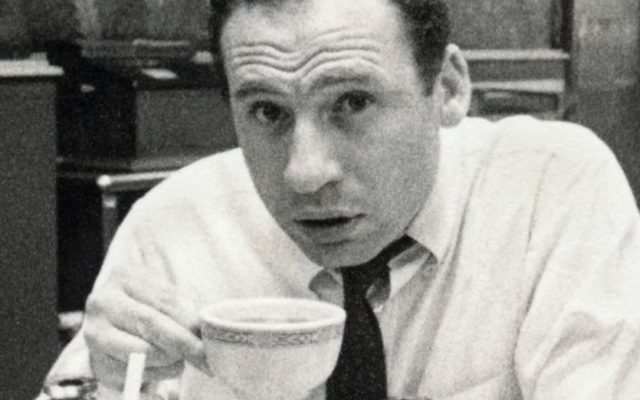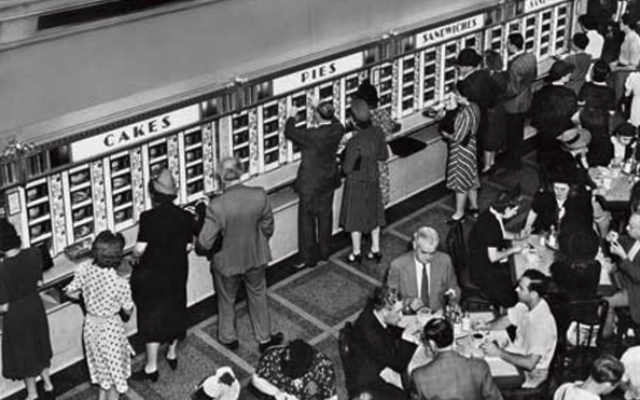Mel Brooks Featured in Film Tribute to the Automat
A new documentary recounts the growth and decline of the once iconic chain of self-service restaurants.

Mel Brooks, the 96-year-old Hollywood legend and comedic force of nature, is back in front of the cameras in Lisa Hurwitz’s “The Automat,” a documentary about the iconic New York and Philadelphia restaurant chain.
Brooks, who gained fame for such comedy classics as “Young Frankenstein,” “Blazing Saddles” and “The Producers,” was born Melvin Kaminsky in 1926 and grew up in Brooklyn. He dominates Hurwitz’s warm and nostalgic story of the rise and fall of the spectacularly successful chain, which she introduced during its Atlanta theatrical premiere on Aug. 23 at The Springs Cinema and Taphouse in Sandy Springs.
From the opening frames of the film, when he is heard on a cell phone call to the filmmaker, to the closing credits, when he performs a musical tribute about the restaurant, his wit and charm shape and solidify the film’s impact. In a way, the elder statesman of comedy is the perfect complement to what Hurwitz describes as the role of the restaurant chain in American life.
“I think that the Automat brings out the humanity in all of us,” she says. “It’s this place that was very inexpensive and nobody had a problem with sitting next to a stranger there. It was a very friendly, welcoming place. And it definitely recalls simpler times. Sometimes these days when we’re so advanced and high-tech, simple gets a bit of a bad rap, but the film demonstrates the beauty in simplicity.”
In the film, Brooks fondly recalls his boyhood trips to spend a few nickels at one of the many Automats in town. There, along with his three brothers, he would gaze longingly at the many mainstream American dishes that beckoned behind a wall of individual glass compartments.
The chain was especially known for its pies and desserts and for such dishes as baked beans, macaroni and cheese, chicken pie and creamed spinach. But one of its most important features was its high-quality coffee, which in those years cost only a nickel a cup.
Like so much of what made the Automats unique, it was dispensed from a large, heavy metal device that was modeled after the head of a mythical dolphin from a fountain in Rome. Later, as one of the writers for Sid Caesar — an early star of television in the 1950s — a local Automat became the place for Brooks’s favorite lunch, a ham and cheese sandwich and that famous coffee. He describes his love of the combination by first asking the forgiveness of his long-since-passed, observant Jewish mother.

Brooks is far from the only Jewish celebrity to make an appearance in the film. Hurwitz persuaded his longtime friend, Carl Reiner, to appear as well. She also included an appreciation from the late Supreme Court Justice Ruth Bader Ginsburg, who remembers how she spent hours at an Automat on the Upper West Side of New York doing her homework.
Howard Schultz, who founded Starbucks, credits his first visit to the Automat at ten years old for inspiring his vision of a chain of coffee shops. Hurwitz, who was educated at Jewish day schools in Los Angeles and later helped to run the Seattle Jewish Film Festival, believes that Automats played an important role in Jewish urban life, particularly in New York from the 1920s to the 1960s.
“For Jews who were living in small tenements, the cafeteria, which is really what the Automat was, was like their extended living rooms,” Hurwitz remarked. “If you were an Irish immigrant, you would go to the neighborhood bar. But Jews didn’t really go to bars. They really embraced the Automat in this period in New York City.”
The film, which debuted at the Telluride Film Festival last year, went on to the Miami Jewish Film Festival, where it was voted best documentary. Since then, it has gained an appreciative following on the festival circuit and next month will get a screening in Venice at the same time as the city’s prestigious international film festival.
Hurwitz is also putting special effort into getting Brooks’s closing number in the film, the song “At the Automat,” nominated for an Academy Award. While she thinks it may be a long shot, Hurwitz believes that the song Brooks wrote and performs with his usual panache over the closing credits would be a fitting tribute to the performer’s long history in Hollywood.
“One of my dreams is to see him on the stage at the Oscars singing that song,” she said. “And so that is one of my top priorities. He wants that, too. So, we’re going to work hard at doing it.”
KinoLorber.com is set to release a special edition DVD of “The Automat” on Sept. 20 that includes a special introduction by Brooks and other extras.
- Automat
- cafeterias
- Mel Brooks
- Lisa Hurwitz
- Spring Cinema and Drafthouse
- Sandy Springs
- Ruth Bader Ginsberg
- Howard Schultz
- Starbucks
- Carl Reiner
- Arts and Culture
- Local
- Bob Bahr
- Young Frankenstein
- Blazing Saddles
- The Producers
- Melvin Kaminsky
- Sid Caesar
- Seattle Jewish Film Festival
- Telluride Film Festival
- Miami Jewish Film Festival



comments